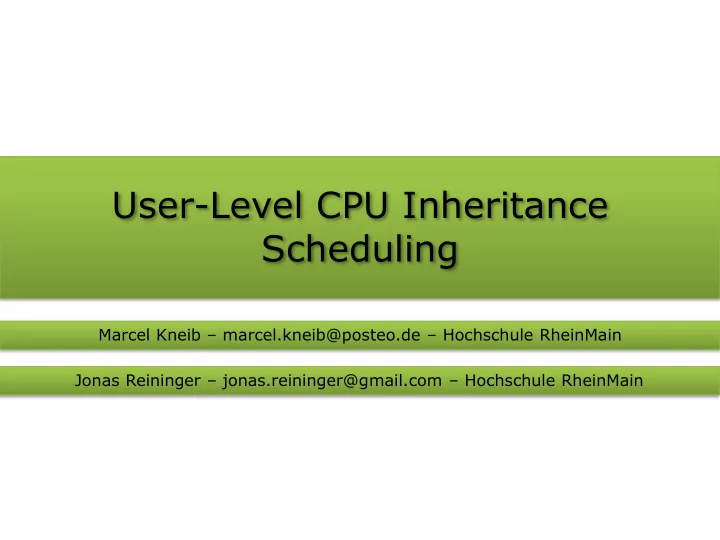

User-Level CPU Inheritance Scheduling Marcel Kneib – marcel.kneib@posteo.de – Hochschule RheinMain Jonas Reininger – jonas.reininger@gmail.com – Hochschule RheinMain
Introduction • Scheduling in user-level • Hierarchy of schedulers • Threads can act as schedulers for other threads 2/16 Hochschule RheinMain Marcel Kneib, Jonas Reininger
Benefits • More flexibility • Smaller trusted code base • Meeting different scheduling requirements • Reduce costs 3/16 Hochschule RheinMain Marcel Kneib, Jonas Reininger
Concept 4/16 Hochschule RheinMain Marcel Kneib, Jonas Reininger
Priority Inheritance H M L Priority inversion H M Mars Pathfinder, 1997 L H Priority inheritance 5/16 Hochschule RheinMain Marcel Kneib, Jonas Reininger
Test Environment Root Scheduler: – H: Real-time • RM1: 50% CPU time • RM2: 25% CPU time – M: Timesharing • LS1: available CPU time – L: Background • RR1: available CPU time • RR2: available CPU time 6/16 Hochschule RheinMain Marcel Kneib, Jonas Reininger
Test 1. RM1 starts consuming 50% CPU time periodically 7/16 Hochschule RheinMain Marcel Kneib, Jonas Reininger
Test 2. RR1 begins to consume alle the CPU time it can get 8/16 Hochschule RheinMain Marcel Kneib, Jonas Reininger
Test 3. RR2 begins with the same priority as RR1 9/16 Hochschule RheinMain Marcel Kneib, Jonas Reininger
Test 4. LS1 begins to steal all available CPU time 10/16 Hochschule RheinMain Marcel Kneib, Jonas Reininger
Test 5. RM2 starts consuming 25% of the CPU time periodically 11/16 Hochschule RheinMain Marcel Kneib, Jonas Reininger
Test 6. LS1 finishes 12/16 Hochschule RheinMain Marcel Kneib, Jonas Reininger
Problems • Dispatcher costs – iteration through list or tree • Context switch costs – approx. one additional context switch • Threads running in one single address space – no memory protection – not isolated 13/16 Hochschule RheinMain Marcel Kneib, Jonas Reininger
Problems 14/16 Hochschule RheinMain Marcel Kneib, Jonas Reininger
Conclusion More flexibility with negligible overhead (in Test • Environment) If per-context-switch-costs are low, CPU Inheritance • Scheduling makes sense even in microkernels Scheduling hierarchy depth should be limited • Sample implementation is based on user-thread • library 15/16 Hochschule RheinMain Marcel Kneib, Jonas Reininger
Questions? Marcel.Kneib@posteo.de Jonas.Reininger@gmail.com
Recommend
More recommend